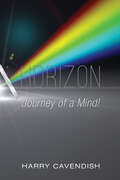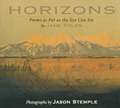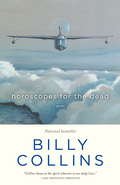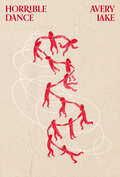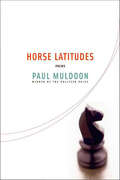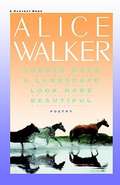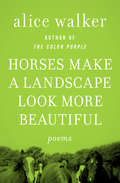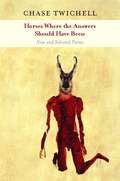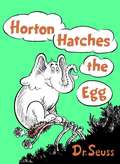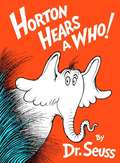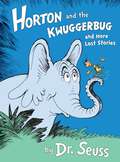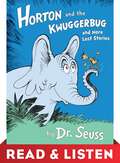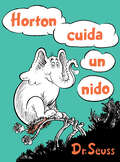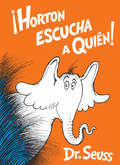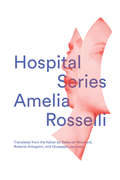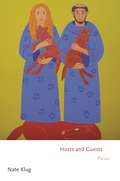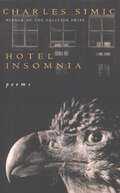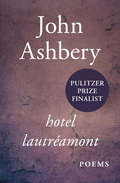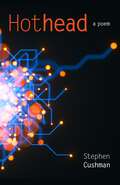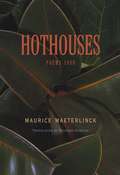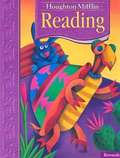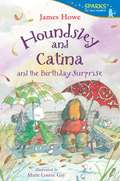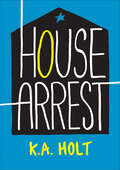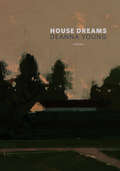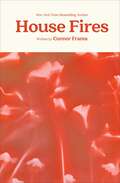- Table View
- List View
Horizon: Journey of a Mind!
by Harry Cavendish'There are only trees on this winter scene Their upward pointing leafless twigs are Shrill with the calm of loveliness, And the Sun laughs down, baleful, with a bleary smile.' A book of poetry with imagery and concepts polished over a lifetime of intellectual inquiry. At 58 years old, it is Cavendish’s first collection of poetry and represents the start of his career rather than the end.
Horizons: Poems as Far as the Eye Can See
by Jane YolenHORIZON: 1. the line where earth and sky appear to meet 2. the limit of a person s experience or knowledge. The world has millions of horizons, because wherever you look, the sky seems to meet some part of the earth: a meadow, a mountain, a river, a sand dune, a line of houses stretching across the sky. Perhaps these photographs and poems will stretch your horizons, too, till you can see the long line of sky as a curtain rising above the stage, inviting you to a play, a celebration, a moment of understanding.
Horoscopes for the Dead: Poems
by Billy CollinsBilly Collins is widely acknowledged as a prominent player at the table of modern American poetry. And in this new collection, Horoscopes for the Dead, the verbal gifts that earned him the title "America's most popular poet" are on full display. The poems here cover the usual but everlasting themes of love and loss, life and death, youth and aging, solitude and union. With simple diction and effortless turns of phrase, Collins is at once ironic and elegiac, as in the opening lines of the title poem: Every morning since you disappeared for good, I read about you in the newspaper along with the box scores, the weather, and all the bad news. Some days I am reminded that today will not be a wildly romantic time for you . . . And in this reflection on his own transience: It doesn't take much to remind me what a mayfly I am, what a soap bubble floating over the children's party. Standing under the bones of a dinosaur in a museum does the trick every time or confronting in a vitrine a rock from the moon. Smart, lyrical, and not afraid to be funny, these new poems extend Collins's reputation as a poet who occupies a special place in the consciousness of readers of poetry, including the many he has converted to the genre.Note to Readers: adjusting the size of the type on your e-reading device may affect the line formatting of this eBook. We have formatted the eBook so that any words that get bumped to a new line in a poem will be noticeably indented.
Horrible Dance
by Avery Lake2022 Governor General's Literary Award Shortlist * 2022 A.M. Klein Prize for Poetry FinalistA brilliant poetic debut about gender-based violence that dismantles received definitions of both gender and violence, Horrible Dance is an accomplished addition to transfeminist thought and theory. By turns darkly comic, emotionally connected, playful, incisive, lyrical and irreverent, Lake’s poems navigate a harrowing personal and political terrain with understated, expansive wisdom. Lake persistently returns us to the search for love that lies at the core of relational trauma, even as she shows us how catastrophically such a search can be derailed. This is a rare text able to hold the full velocity of a survivor’s hurt and rage alongside a clear-eyed understanding of the extent and complexity of harm. In their honest accounting of a wide array of bad encounters, these poems point us, again, toward compassion, tenderness, and solidarity. can you forgive mefor how you hurt me so bad—“On Shame”
Horse Latitudes: Poems
by Paul MuldoonThe title of Horse Latitudes, Paul Muldoon's tenth collection of poetry, refers to those areas thirty degrees north and south of the equator where sailing ships tend to be becalmed, where stasis (if not stagnation) is the order of the day. From Bosworth Field to Beijing, the Boyne to Bull Run, from a series of text messages to the nineteenth-century Irish poet Tom Moore to an elegy for Warren Zevon, and from post-Agreement Ireland to George W. Bush's America, this book presents us with fields of battle and fields of debate, in which we often seem to have come to a standstill, but in which language that has been debased may yet be restruck and made current to our predicament. Horse Latitudes is a triumphant new collection by one of the most esteemed poets of our time.
Horses Make a Landscape Look More Beautiful
by Alice WalkerAlice Walker has always turned to poetry to express some of her most personal and deeply felt concerns. She has said that her poems--even the happy ones--emerge from an accumulation of sadness, when she stands again "in the sunlight."
Horses Make a Landscape Look More Beautiful: Poems
by Alice WalkerPoems from the author of The Color Purple: &“This book has two fine strengths—a music that comes along sometimes [and] Walker&’s own tragicomic gifts&” (The New York Times Book Review). The title of this collection comes from a Native American shaman who, reflecting on the terrible problems brought by white colonizers, nearly forgave them all because with the settlers came horses to the North American Plains. And, indeed, in these poems we find Alice Walker seeking a saving grace even in the most difficult circumstances, and in the hearts of the most brutal oppressors. Here Walker&’s attention turns toward the small moments and subliminal exchanges between lovers and enemies, even as her verse addresses concerns as vast as the choking of the planet by war and pollution.This ebook features an illustrated biography of Alice Walker including rare photos from the author&’s personal collection.
Horses Where the Answers Should Have Been
by Chase Twichell"[Twichell's] poems generate the requisite heat with the poet's precise, original and frequently brilliant use of language. . . . A major voice in contemporary poetry." --Publishers Weekly"[Twichell's poems] track the inner movements of one life with an unexpected freshness." --The Washington PostPublishers Weekly called Chase Twichell "a major voice in contemporary poetry," and this long overdue retrospective supports the claim. Selected from six award-winning books, this volume collects the best of Twichell's meditative and startling poems. A longtime student of Zen Buddhism, Twichell probes how the self changes over time and how the perception of self affects the history and meaning of our lives. Her poems exhibit a deep and urgent love of the natural world amidst ecological decimation, while also delving into childhood memories and the surprise and nourishment that come from radical shifts in perception.What etiquette holds us backfrom more intimate speech,especially now, at the end of the world?Can't we begin a conversationhere in the vestibule,then gradually move it inside?What holds us backfrom saying things outright?Chase Twichell is the author of six books of poetry and the best-selling writer's manual Practice of Poetry. She is the founding editor of Ausable Press and lives in rural New York with her husband, the novelist Russell Banks.
Horton Hatches the Egg
by Dr SeussMayzie is tired of sitting on her nest, but what other animal could give her some rest? Not a cow! Not a horse! Surely not Horton! He's bigger than a horse! But Horton is kind, And his word is true. Horton hatches that egg! Dear reader, it's true! This file should make an excellent embossed braille copy. .
Horton Hears a Who!
by Dr Seuss"After all! A person's a person. No matter how small!" Other books by Dr. Seuss are available from Bookshare.
Horton and the Kwuggerbug and More Lost Stories (Classic Seuss)
by Dr. SeussA follow-up to The Bippolo Seed and Other Lost Stories by Dr. Seuss! A new Dr. Seuss book! This follow-up to The Bippolo Seed and Other Lost Stories features familiar Seussian faces and places—including Horton the Elephant, Marco, Mulberry Street, and a Grinch—as well as an introduction by renowned Seuss scholar Charles D. Cohen. Seuss fans will learn more about Horton&’s integrity, Marco&’s amazing imagination, a narrowly avoided disaster on Mullbery Street, and a devious Grinch. With a color palette enhanced beyond that of the magazines in which the stories originally appeared, this new volume of &“lost&” tales is a perfect gift for young readers and a must-have for Seuss collectors of all ages!
Horton and the Kwuggerbug and more Lost Stories: Read & Listen Edition (Classic Seuss)
by Dr. SeussA follow-up to The Bippolo Seed and Other Lost Stories by Dr. Seuss! A new Dr. Seuss book! This follow-up to The Bippolo Seed and Other Lost Stories features familiar Seussian faces and places—including Horton the Elephant, Marco, Mulberry Street, and a Grinch—as well as an introduction by renowned Seuss scholar Charles D. Cohen. Seuss fans will learn more about Horton&’s integrity, Marco&’s amazing imagination, a narrowly avoided disaster on Mullbery Street, and a devious Grinch. With a color palette enhanced beyond that of the magazines in which the stories originally appeared, this new volume of &“lost&” tales is a perfect gift for young readers and a must-have for Seuss collectors of all ages!This Read & Listen edition contains audio narration.
Horton cuida un nido (Classic Seuss)
by Dr. Seuss¡Edición en español y rimada del clásico de Dr. Seuss en el que se nos presenta por primera vez a Horton el elefante! Querido durante generaciones por su bondad y lealtad, Horton el elefante es uno de los personajes más icónicos y respetados de la literatura infantil. En este libro, en el que Horton pronuncia las palabras «Va en serio lo que dije, y lo que dije así lo siento… Un elefante es leal, ¡y es leal al cien por ciento!», vemos recompensada su integridad con una sorpresa final que encantará a los lectores de todas las edades. Las ediciones rimadas en español de los clásicos de Dr. Seuss, publicadas por Random House, brindan la maravillosa oportunidad de disfrutar de sus historias a más de treinta y ocho millones de personas hispanohablantes en Estados Unidos. Los lectores podrán divertirse con las ediciones en español de The Cat in the Hat (El Gato Ensombrerado); Green Eggs and Ham (Huevos verdes con jamón); One Fish, Two Fish, Red Fish, Blue Fish (Un pez, dos peces, pez rojo, pez azul); The Lorax (El Lórax); Oh, the Places You'll Go! (¡Oh, cuán lejos llegarás!); How the Grinch Stole Christmas! (¡Cómo el Grinch robó la Navidad!); The Cat in the Hat Comes Back (El Gato Ensombrerado ha regresado); I Can Read Wwth My Eyes Shut! (¡Yo puedo leer con los ojos cerrados!); Horton Hears a Who! (¡Horton escucha a Quién!); The 500 Hats of Bartholomew Cubbins (Los 500 sombreros de Bartolomé Cubbins); There's a Wocket in My Pocket! (¡Hay un Molillo en mi Bolsillo!); Mr. Brown Can Moo! Can You? (¡El Sr. Brown hace Muuu! ¿Podrías hacerlo tú?); Ten Apples Up on Top! (¡Diez manzanas en la cabeza!); What Pet Should I Get? (¿Cómo podré decidir qué mascota elegir?); Yertle the Turtle and Other Stories (Yoruga la Tortuga y otros cuentos); Oh, the Thinks You Can Think! (¡Oh, piensa en todo lo que puedes pensar!); The Foot Book! (¡Cuántos, cuántos pies!); Happy Birthday to You! (¡Feliz cumpleaños!); Come Over to My House (Ven a mi casa); Dr. Seuss's Sleep Book (¡Dormilones!); Would You Rather Be a Bullfrog? (¿Preferirías ser una rana?); Horton Hatches the Egg (Horton cuida un nido); y Dr. Seuss's 1 2 3 (Cuenta con Dr. Seuss 1 2 3). A rhymed, Spanish edition of the Dr. Seuss classic that first introduced Horton the Elephant! Beloved by generations for his kindness and loyalty, Horton the Elephant is one of the most iconic and honorable characters in children's literature. In this book—the comic classic in which Horton utters the line "I meant what I said, and I said what I meant. . . . An elephant's faithful, one hundred per cent!"—we see his integrity rewarded with a surprise ending that will delight readers of all ages.
Horton escucha a Quién! (Classic Seuss)
by Dr. Seuss¡Edición en español y rimada del clásico de Dr. Seuss acerca de la bondad! Horton el elefante, uno de los personajes más heroicos de la literatura infantil, nos enseña en esta intemporal, conmovedora y cómica historia que «una persona es una persona, por muy pequeña que sea». Contada con el estilo de Dr. Seuss, y con sus característicos dibujos, esta edición en español será del agrado de lectores y oyentes por igual.Las ediciones rimadas, en español, de los clásicos de Dr. Seuss, publicadas por Random House, brindan la maravillosa oportunidad de disfrutar de sus historias a más de treinta y ocho millones de personas hispanohablantes en Estados Unidos. A rhymed Spanish translation of Dr. Seuss's classic picture book about kindness!Horton the elephant—one of the most heroic characters in children's literature—shows us that "a person's a person, no matter how small" in this timeless, moving, and comic classic. Told with Dr. Seuss's signature rhymes and trademark illustrations, this Spanish edition of the beloved tale that will be enjoyed over and over, by reader and listener alike.Random House's rhymed, Spanish-language editions of classic Dr. Seuss books make the joyful experience of reading Dr. Seuss books available for the more than 38 million people in the United States who speak Spanish.
Hospital Series
by Giuseppe Leporace Amelia Rosselli Deborah Woodard Roberta AntogniniA poem cycle about hospital life and illness by revered, twentieth-century Italian avant-gardist. Hospital Series, a bruisingly intimate colloquy with an elusive lover, is Italian poet Amelia Rosselli's virtuoso, subversive, neo-Petrarchan sequence of poems. Rosselli wrote much of the series in the mid 1960s after being hospitalized for a mental illness she suffered from for most of her life, and whose pain shapes her language and difficult vision. These explosive poems, a furious cacophonic crescendo of semantic and syntactic accumulations deeply admired by Pier Paolo Pasolini, place Rosselli among the greatest writers of her generation.
Hosts and Guests: Poems (Princeton Series of Contemporary Poets #152)
by Nate KlugAn exciting new collection from a poet whose debut was praised by Colorado Review as “a seduction by way of small astonishments”Nate Klug has been hailed by the Threepenny Review as a poet who is “an original in Eliot’s sense of the word.” In Hosts and Guests, his exciting second collection, Klug revels in slippery roles and shifting environments. The poems move from a San Francisco tech bar and a band of Pokémon Go players to the Shakers and St. Augustine, as they explore the push-pull between community and solitude, and past and present. Hosts and Guests gathers an impressive range: critiques of the “immiserated quiet” of modern life, love poems and poems of new fatherhood, and studies of a restless, nimble faith. At a time when the meanings of hospitality and estrangement have assumed a new urgency, Klug takes up these themes in chiseled, musical lines that blend close observation of the natural world, social commentary, and spiritual questioning. As Booklist has observed of his work, “The visual is rendered sonically, so perfectly one wants to involve the rest of the senses, to speak the lines, to taste the syllables.”
Hotel Insomnia: Poems
by Charles SimicIn this volume, Simic fills the wee hours of his poetry with angels and pigs, riddles and cemeteries. His is a rich, haunted world of East European memory and american present-a world of his own creation, one always full of luminous surprise. “Simic writes so simply that his words fall like drops of water, but they ripple outward to evoke an ominous and numinous world” (Washington Post Book World).
Hotel Lautréamont: Poems
by John AshberyIn John Ashbery&’s haunting 1992 collection, just as in the traveler&’s experience of a hotel, we recognize everything, and yet nothing is familiar—not even ourselvesHotel Lautréamont invites readers to reimagine a book of poems as a collection of hotel rooms: each one empty until we enter it, and yet in truth abundantly furnished with associations, necessities, and echoes of both the known and the alien. The collection&’s title poem is itself an evocative echo: Comte de Lautréamont was the pseudonym taken by Isidore-Lucien Ducasse, a radical nineteenth-century French writer about whom little is known except that he produced one remarkable presymbolist epic prose poem called The Songs of Maldoror and died of fever at the age of twenty-four in a hotel in Paris during Napoleon III&’s siege of the city in 1870. Addressed to lonely ghosts, lingering guests, and others, the poems in Hotel Lautréamont present a study of exile, loss, meaning, and the artistic constructions we create to house them.
Hothead: A Poem
by Stephen CushmanHothead is a haibun-patterned, book-length declamation in which no topic is off limits—Buddha, Jesus, Lincoln, America, global warming, eros, mental illness, the natural world, technology, the aging body. Cushman’s poetry shows us how to live in a world in which it is difficult to balance “the place where light and dark meet.” With an outmoded laptop named Patience as his daily consort, the speaker navigates through themes of love, politics, and belief. “There’s got to be someone,” Cushman writes, “exploring the way,” and the speaker of Hothead steps in to fill those shoes with intelligence, endurance, moxie, and humility.
Hothouses: Poems, 1889 (Facing Pages #2)
by Maurice MaeterlinckOn May 31, 1889, a young Belgian lawyer from a wealthy bourgeois family in Ghent published a book of 33 poems in 155 copies. Maurice Maeterlinck's legal career was floundering but his road to literary greatness had begun. Long overshadowed by the plays that later won him the Nobel Prize, Serres chaudes (Hothouses) nonetheless came to be widely regarded as one of the cornerstones of literary Modernism after Baudelaire. While Max Nordau soon seized upon Maeterlinck's--tumult of images--as symptomatic of a pervasive social malaise, decades later Antonin Artaud pronounced, "Maeterlinck was the first to introduce the multiple riches of the subconscious into literature." Richard Howard's translation of this quietly radical work is the first to be published in nearly a century, and the first to accurately convey Maeterlinck's elusive visionary force. The poems, some of them in free verse (new to Belgium at the time), combine the decadent symbolism and the language of dislocation that Maeterlinck later perfected in his dramas. Hothouses reflects the influence not only of French poets including Verlaine and Rimbaud, but also of Whitman. As for the title, the author said it was "a natural choice, Ghent . . . abounding in greenhouses." The poems, whose English translations appear opposite the French originals, are accompanied by reproductions of seven woodcuts by Georges Minne that appeared in the original volume, and by an early prose text by Maeterlinck imaginatively describing a painting by the sixteenth-century Flemish artist Pieter Brueghel. A feat of daring power extraordinarily immediate and inventive, Hothouses will appeal to all lovers of poetry, and in particular to those interested in Modernism. Maeterlinck's enormous fame may have faded, but twentieth-century writers such as Beckett are still our masters who testify to its undying influence.
Houghton Mifflin Reading Rewards Level 3.1
by Houghton MifflinThe book contains: Theme 1: Off to Adventure!- Focus on Poetry; Theme 2: Celebrating Traditions-Focus on Trickster Tales; and Theme 3: Incredible Stories.
Houndsley and Catina and the Birthday Surprise (Fountas & Pinnell LLI Blue #Level K)
by James Howe Marie-Louise GayHoundsley is sad. Not because it is raining or because there are holes in his sweater, but because he doesn't know when his birthday is. All of a sudden Catina is sad, too. But friends are very good at cheering each other up, and Houndsley and Catina are the very best of friends. So it won't be long before they each discover, in a most surprising way, how a first-rate friend can brighten even the saddest days.
House Arrest
by K. A. HoltTimothy is on probation. It's a strange word--something that happens to other kids, to delinquents, not to kids like him. And yet, he is under house arrest for the next year. He must check in weekly with a probation officer and a therapist, and keep a journal for an entire year. And mostly, he has to stay out of trouble. But when he must take drastic measures to help his struggling family, staying out of trouble proves more difficult than Timothy ever thought it would be. By turns touching and funny, and always original, House Arrest is a middlegrade novel in verse about one boy's path to redemption as he navigates life with a sick brother, a grieving mother, and one tough probation officer.
House Dreams
by Deanna YoungHouse Dreams, Deanna Young's haunted and haunting third collection, is at once a core sample of the life we all live underground, and a view beneath the foundations of the various eras and places that make up one woman's life story. These poems have the plainspoken power, surreal shifting, uncanny logic and transformed everyday imagery of our most numinous dreams. It's as if Jung's assertion that "[w]hen an inner situation is not made conscious, it appears outside as fate," is taken up here as a reading guide back through time.
House Fires
by Connor FrantaThe New York Times bestselling author of A Work in Progress and Note to Self moves fully into adulthood with his illuminating, soulful, bleeding collection of narrative, poetry, and original film photography.Humanitarian, entrepreneur, and content creator Connor Franta first captivated readers with A Work In Progress, ruminating on his Midwestern roots to his early start as a visionary and online thought-leader. He continued his soul-searching-through-a-broken-heart with Note to Self, challenging readers—and himself—to ponder the spectrum of humanity and their place within it. Now as Franta approaches thirty, life is no less confusing, but he finds this journey endlessly fascinating. Writing about confusion and clarity, loneliness and whirlwind romances, despair and elation—and everything in between—Franta invites readers back into the intimacy of his mind. House Fires magnifies a young man&’s emotional warfare with his past, the daze of wandering through modern times in search of purpose, and the electricity flying from tomorrow&’s potential.
